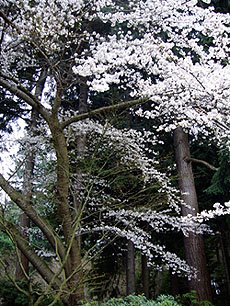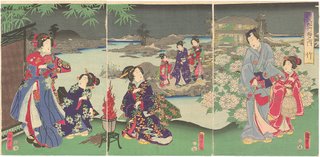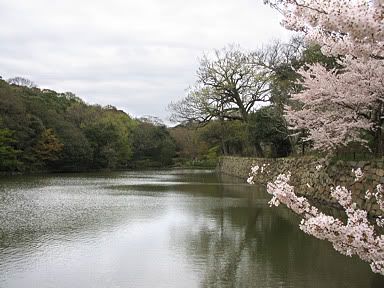Picture Source:
http://www.lcv.ne.jp/~komd1/asagao.htm
Although Tyler gives us the translation as "The Bluebell", searching for that does not give the same flower as the "Asagao". Asagao are actually morning glories, which are very similar to the moonflower (yugao), except that they open only in the morning and have a blue colour. I am not sure why Tyler went with bluebells, anyone have any ideas? Moon flowers and morning glories are both poisonous. The Japanese morning glory is originally from China, and it can not grow in the shade. The flowers are hermaphrodite.
In Relation to Genji:
The naming of Yugao and Asagao may be no coincidence. Even though they are similar in appearance, they are polar opposites. One opens in the day, the other, during the night. As we know, Asagao does not give in to Genji's advances. In chapter 9:
"News of all this confirmed the lady of the bluebells in her resolve that nothing of the kind should happen to her, and she rarely gave him the simplest reply. Still, he often thought how unusual it was of her, and how like her, too, not to dismiss him outright" (166).
The text's description of Asagao's decision seems very carefully worded. It is not quite a refusal. It leaves room for reflection of her intentions, it seems deliberately ambiguous because one could easily make the argument that she may have feelings for him but are hiding them because of A) Her status as a princess and/or B) Genji's recent "bad press" after his affair with Oborozukiyo. It is more elaborated upon in Chapter 20 that Genji's flirtatious behaviour is thought of by Asagao as unbecoming for his station, " ..His attitude was somewhat kinder and more tactful than in the past, but despite all his years of life since then, it remained unworthy of his rank"(367). Asagao, a princess, does not fall prey to his charms as much other ladies, "...she felt that to show him sympathy would be to range herself in his eyes beside those other women who made so much of him and to betray her own lack of character as well..."(372). She places her dignity above all, and follows a path of strict propriety. The only way in which she gives in to Genji is through the reluctant exchange of poems. Yugao bloomed for Genji during that one night, but Asagao only receives him during the day, which alludes to the Asagao flower opening only in the morning and the Yugao flower at night.
Can Asagao be seen as the "worst" kind of flawed woman portrayed in The Broom Tree chapter?
"As long as a girl has looks and youth enough, she avoids anything that might soil her name. Even when composing a letter, she takes her time to choose her words and writes in ink faint enough to leave your bemused and longing for something clearer; then when at least you get near enough to catch her faint voice, she speaks under her breathe, says next to nothing, and proves to be an expert at keeping herself hidden away..." (25).
Asagao is very self-aware of her position in the world, and does nothing to endanger her reputation. She keeps herself hidden away, by conversing with Genji only through her gentlewomen. She replies to Genji out of politeness, but the replies alone stimulate Genji into trying harder to earn her affections. Interestingly, her resistance of him only earns disapproval from the people around her, because to everyone else she appears coy. Genji is so widely admired, that I think the common belief is why wouldn't you want to submit to him? An example of this is the Akashi Novice and wife, who are very eager to give their daughter to Genji despite the knowledge that he has a very roving eye - it is that roving eye which brought him to exile in the first place. It seems that Genji's beauty is such that one can do no wrong by falling in love with him. Such is why in chapter 20, the gentlewomen and other staff all sympathizes with Genji and wonder at her cool treatment of him. The courtship is a contest of wills between Asagao and Genji. Genji's skill is such that he can play the earnest suitor easily. Burning passion is not a pre-requisite, "Genji did not exactly burn for her, but her coolness maddened him, and he hated to admit defeat" (372). Even though Genji has resolved his wanton ways, it appears he can not help himself. His attempts at Asagao do not earn him her affections, and by the end of chapter 20 he only damages his relationship with Murasaki who is upset by all of it. Is the blame upon Genji, for his stubborn pursuit of Asagao, and for perhaps taking her polite replies as possible interest? Or is it Asagao's, for refusing him despite the emptiness of her residence? Certainly, the people around Asagao see Genji as a charming prince and Asagao as a cruel, unyielding princess, because she never completely rejects him. They are quick to sympathize with Genji instead of their mistress. Although he clearly does not burn for Asagao, he sheds tears in front of her and recites beautiful poetry. Genji’s skill in the manipulation of poetry, elevates his charm and appeal. His engagement in the aesthetic is what wins over Asagao’s staff, but not Asagao herself.
Genji’s attraction to the hidden flower is played out through this passage: “…Genji naturally lay wake, deep in thought. He had the shutters raised early and gazed at the morning mist. Bluebells bloomed forlornly here and there among the dying flowers, and he picked a particularly one…” (367). Indeed, Genji perceives Asagao’s lifestyle in her increasingly deserted home as much like the pretty bluebell among the dying flowers. Genji takes it upon himself to “pick” her and to continue his habit of never ending a courtship once it has begun. Asagao’s response is that she is not a blooming flower, but a withering one. Instead of giving up, Genji multiplies his efforts. Within the text, Asagao’s cold treatment of Genji is thought of as extremely uncomfortable. This reminds me our last Thursday class with our wonderful guest speaker when we discussed the freedom of Heiian women to reject a courtship. Although Asagao exercises that freedom, she is not treated better for it. Throughout the text, there are many allusions to Genji as a shining force, like the sun. If we consider this, the withdrawal of his presence from her life has the effect of the lack of sunlight for a flower – she is the pretty flower who will wither away amongst the dying flowers.
Sources:
http://www.nbrp.jp/report/reportProject.jsp?project=morningGlory
http://davesgarden.com/pf/go/53231/index.html
http://www.pfaf.org/database/plants.php?Ipomoea+nil









